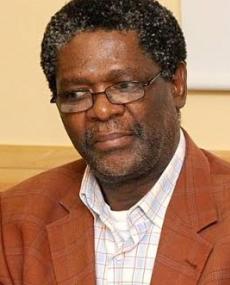
Moses Jongizizwe Mayekiso
Moses Jongizizwe Mayekiso was born on 21 October 1948 in Askeaton, Cala district, Transkei. He was the eldest of 12 children to Ellen and Betwell Mayekiso. He attended the Askeaton Primary School, the Matanzima Secondary School and later Mfundisweni High School in Pondoland East. In 1972 Mayekiso left school to work in the Welkom mines in the Free State province. Dissatisfied with the working conditions, he left before his contract expired, for Alexandra, in Johannesburg, where he lived with a relative.
From 1973 Mayekiso was in and out of jobs, until Toyota Marketing in Sandton employed him on a permanent basis. In 1979, he was elected shop steward for the Metal and Allied Workers Union (Mawu). Following a strike over union recognition, he, together with the members of Mawu, was dismissed. In 1980 Mayekiso became the full-time organiser of Mawu in the East Rand and in November 1984, he participated in a meeting of 37 organisations that formed the Transvaal Regional Stayaway Committee in Johannesburg. The Stayaway Committee organised a two-day strike, which resulted in the detention of Mayekiso and other four members of the committee. They were charged in terms of the Internal Security Act; however, the charges were later dropped after the other four went into exile.
In 1985 Mayekiso was elected chairman of the Alexandra Action Committee (AAC). This body was responsible for the street committee structures operating in the township. In the same year Mayekiso was central to the formation of the Congress of South African and Trade Unions (Cosatu), and served on the committee that drew up its constitution and planned its inaugural congress.
In February 1986 when the South African Security forces attacked a funeral in Alexandra they were met with fierce resistance, which led to the arrests of the entire AAC leadership with Mayekiso later enduring five days of beating. The South African government laid the blame solely on the AAC for having encouraged the attack on the police. On 5 March 1986 metal workers in Transvaal and Natal stopped work in protest of Mayekiso's detention. Their pressure paid off when he was released two days later.
Mayekiso was appointed Secretary General of Mawu in May 1986 and, two months later, after his return from Sweden he was again arrested under the Internal Security Act. He was held for seven months in solitary confinement and was facing the death penalty on charges of high treason. Mayekiso and those arrested with him were alleged to have been plotting to take over Alexandra, render it ungovernable and form a people's courts. This led them to endure the wrath of the government, but not before its action drew wide condemnation both within and outside the country. On 24 August 1987 at Union Square in San Francisco over 40 protesters rallied for the “Free Moses Mayekiso” and “Free All Anti-Apartheid Prisoners in South Africa” campaign.
Following the formation of the National Union of Metalworkers of South Africa (NUMSA), Mayekiso was elected Secretary General in Absentia. On December 1988, he was released on R10 000 bail and acquittal the following year in April.
In July 1989 he travelled to Lusaka, Zambia, and had discussions with the African National Congress (ANC), which informed the Organisation of African Unity's documents on negotiations between the ANC and government. With the relaunching of the South African Communist Party (SACP) as a legal body after the unbanning of all political organisations in South Africa, Mayekiso was named as one of the party's 22-person interim leaders and the following year in December he was elected to the SACP central committee. In 1990, Mayekiso was elected as a member of the Civic Associations of the Southern Transvaal (Cast), which aimed to unify the various bodies in different townships. In the same year, he organised a sit-in at the Pretoria headquarters of Hernus Kriel ‘s Department of Planning and Provincial Affairs. Kriel accused him of establishing organisations against the government. On 28 August 1990 Mayekiso, Fholisani Mufamadi and Jay Naidoo kidnapped security policeman Monge Maleka on the allegation that he was a spy. The Truth and Reconciliation Commission 's Amnesty Committee later acquitted them as their actions were seen to be politically motivated.
Mayekiso later crossed swords with Cyril Ramaphosa when he refused to participate in Frederick Van Zyl Slabbert 's non-racial metropolitan local government forum. The Central Johannesburg Metropolitan Chamber believed that the process was not thoroughly discussed by the civic organisations. In 1992 Mayekiso was elected president of the South African National Civic Organisations (SANCO). He later claimed that after the brutal assassination of Chris Hani, he received death threats. He and his bodyguards were later arrested for illegal possession of two Makharov pistols. In 1994, Mayekiso became a Member of Parliament but resigned two years later, saying he could not bear another committee room hearing on yet another development project that had failed due to lack of grassroots know-how.
He is now the Chief Executive Officer of SANCO Holdings.
A United States University has honoured him with doctorate for his role in labour issues.